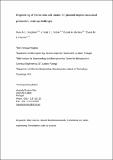Engineering of Escherichia coli strains for plasmid biopharmaceutical production: Scale-up challenges
Author(s)
Monteiro, Gabriel A.; Goncalves, Geisa A. L.; Prather, Kristala L. Jones; Prazeres, Duarte M. F.
DownloadPrather_Engineeering of.pdf (365.5Kb)
PUBLISHER_CC
Publisher with Creative Commons License
Creative Commons Attribution
Terms of use
Metadata
Show full item recordAbstract
Plasmid-based vaccines and therapeutics have been making their way into the clinic in the last years. The existence of cost-effective manufacturing processes capable of delivering high amounts of high-quality plasmid DNA (pDNA) is essential to generate enough material for trials and support future commercialization. However, the development of pDNA manufacturing processes is often hampered by difficulties in predicting process scale performance of Escherichia coli cultivation on the basis of results obtained at lab scale. This paper reports on the differences observed in pDNA production when using shake flask and bench-scale bioreactor cultivation of E. coli strains MG1655ΔendAΔrecA and DH5α in complex media with 20 g/L of glucose. MG1655ΔendAΔrecA produced 5-fold more pDNA (9.8 mg/g DCW) in bioreactor than in shake flask (1.9 mg/g DCW) and DH5α produced 4-fold more pDNA (8 mg/g DCW) in bioreactor than in shake flask (2 mg/g DCW). Accumulation of acetate was also significant in shake flasks but not in bioreactors, a fact that was attributed to a lack of control of pH.
Date issued
2014-03Department
MIT-Portugal Program; Massachusetts Institute of Technology. Department of Chemical EngineeringJournal
Vaccine
Publisher
Elsevier
Citation
Goncalves, Geisa A.L., Kristala L.J. Prather, Gabriel A. Monteiro, and Duarte M.F. Prazeres. “Engineering of Escherichia Coli Strains for Plasmid Biopharmaceutical Production: Scale-up Challenges.” Vaccine 32, no. 24 (May 2014): 2847–2850.
Version: Author's final manuscript
ISSN
0264410X